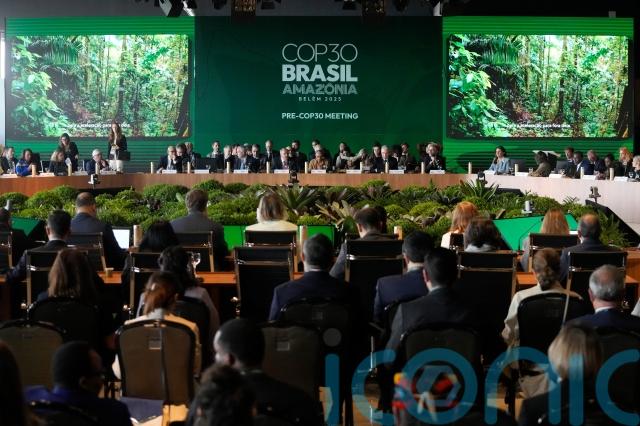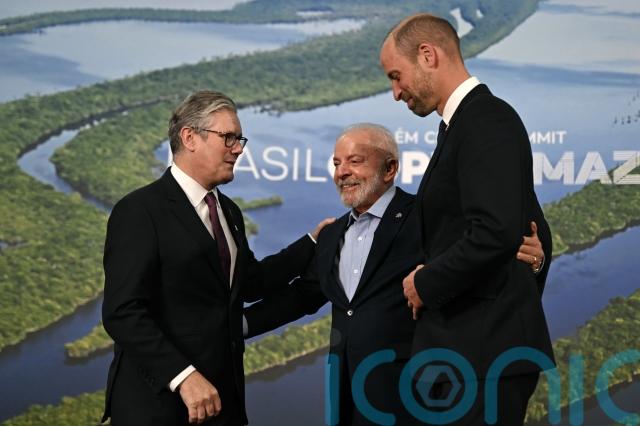
As Cop30 gets under way in Brazil, here are answers to some of the key questions about the climate conference.
– What is Cop30?
Cop30 is the 30th “Conference of Parties”. It is the latest set of UN climate negotiations, which take place every year.
Governments, business leaders, scientists and campaigners will gather this year in the city of Belem in Brazil’s Amazon Rainforest, for two weeks of talks from November 10 to 21.
Negotiators will also be seeking to make progress on climate action against a backdrop of global divisions, deepened by the election of US President Donald Trump, record heat and a string of deadly weather events.
– What is on the agenda?
With the energy transition moving forward at different speeds across the world, negotiators will focus on how to push forward action and deliver on global commitments to cut planet warming emissions amid increasingly dire warnings over the planet’s future.
Boosting adaptation to climate change and integrating nature more meaningfully into the final agreement will also be front of centre of the talks.

Many countries are expected to publish their new national action plans to cut emissions – known as nationally determined contributions (NDCs), which outline how each nation plans to help meet the goals of the 2015 global Paris Agreement to limit dangerous warming.
The latest NDCs, which cover 2025 to 2035, were meant to be submitted by September but the majority of countries have yet to do so.
With more NDCs expected to be unveiled in Belem, the world will be waiting to scrutinise the plans as negotiators discuss how to accelerate the rollout of measures they outline.
Beyond an already announced fund to protect the world’s rainforests, Cop30 could bring a package of announcements on nature initiatives.
Carbon markets and climate finance are also on the agenda as are measures to tackle nitrogen emissions and cut down on methane as a “handbrake” to warming in the near-term.
– How is the world doing on climate action?
Since the Paris Agreement, where countries pledged to pursue efforts to limit warming to 1.5C above pre-industrial levels, the world has seen some landmark agreements, the green transition has truly crossed the starting line and almost 200 countries have put forward plans to cut emissions.
But the UN has warned that existing policies are falling so far short and the world is on track for 2.8C of global warming.
Last year was the warmest on record globally as climate change was compounded by the El Nino weather phenomenon and UN scientists recently warned that 2025 is on track to be the second or third warmest.
And the last year has seen extreme weather events that experts say were intensified by global warming, including Hurricane Melissa, which devastated Jamaica last month, widespread wildfires in Los Angeles, devastating droughts across South America and floods in Pakistan, which left millions homeless.
In its annual report on the gap between the emissions cuts needed to limit global warming to 1.5C and what countries are doing and have pledged to do, the UN Environment Programme (UNEP) said progress was “nowhere near fast enough”.
The World Meteorological Organisation (WMO) said it was “virtually impossible” to curb global warming to 1.5C in the next few years without temporarily overshooting the threshold but it is “still entirely possible and essential” to bring temperatures down to the goal by the end of the century.
– How will the broken consensus over climate action affect talks?
Many countries, including the UK, are bracing to defend multilateralism itself at the summit this year as geopolitical divisions continue to deepen, especially with some oil rich nations railing against commitments to phase out fossil fuels.
This year, negotiators are grappling with the fallout from the election of US President Donald Trump, who began his second term this year by backing fossil fuels and ditching green policies.
Mr Trump is also pulling America out of the 2015 UN Paris Agreement for the second time, marking a significant setback for the global framework that committed countries to pursue efforts to limit dangerous warming to the key threshold of 1.5C above pre-industrial levels.
The US president snubbed the leaders’ summit last week, as did leaders from China and India, and his administration is not expected to send any high-level representatives to Cop30.

Concerns remain that the US will still seek to frustrate the talks after it helped to derail a landmark deal to cut global shipping emissions in London last month.
But the UK is preparing to stand alongside the vast majority of countries that want to accelerate collective climate action.
– What is the UK’s position?
In a speech in Brazil on Friday, the Prime Minister said the UK was “doubling down on the fight against climate change” amid the broken consensus.
Sir Keir also staunchly defended his Government’s clean energy policies despite pressure from Mr Trump, who has repeatedly criticised Britain’s green agenda.
But the Government’s decision not to invest in a Brazilian-led rainforest fund, which the UK played a key role in establishing, quickly received backlash from green groups.
The British delegation is understood to be going into the talks with a strategy focused on accelerating the implementation of climate action as well as defending multilateralism and the Paris Agreement from the direct attacks it now faces.
Subscribe or register today to discover more from DonegalLive.ie
Buy the e-paper of the Donegal Democrat, Donegal People's Press, Donegal Post and Inish Times here for instant access to Donegal's premier news titles.
Keep up with the latest news from Donegal with our daily newsletter featuring the most important stories of the day delivered to your inbox every evening at 5pm.